Watching out for warning signs: If care is not taken, death could be the only symptom of a cardiac arrest
NICVD’s silver jubilee celebrations start with specialists discussing causes of heart attack.
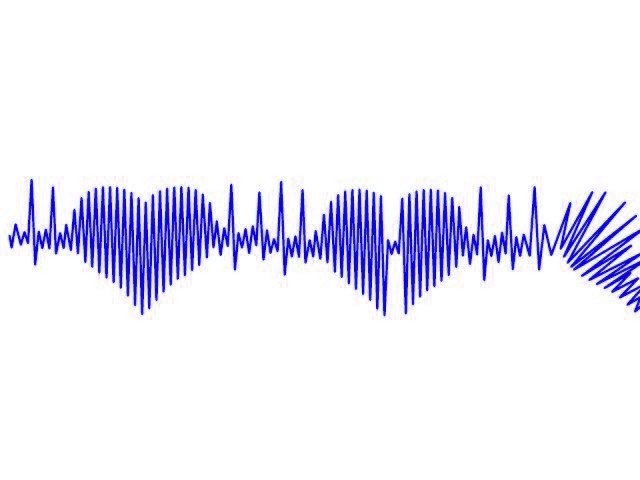
Dr Jamal said that every minute was vital if a person becomes unconscious because of a cardiac arrest. “The chances of survival decreases to 50 per cent after five minutes.”
Cardiac specialists have advised people of all ages to understand the major causes of sudden death as slight changes in lifestyles and eating habits and having basic knowledge about rescue efforts could save thousands of lives.
These views were shared at an awareness seminar, Sudden Death, organised by the National Institute of Cardiovascular Diseases (NICVD) on Friday. The first day of the three-day golden jubilee celebrations of the institute was attended by doctors, medical practitioners, teachers and students of public schools.
“The role of hospitals and doctors comes second if the attendants bring a patient to the hospital on time,” said NICVD executive director, Prof. Khan Shah Zaman. He said that the general public should learn resuscitation tips so that all efforts could be made to bring the patient to the hospital alive.
Dr Syed Zahid Jamal, an associate professor of NICVD and Pacing and Electrophysiology Laboratory’s in-charge, highlighted the symptoms of heart attacks and shared tips on how to avoid sudden death caused by cardiac failure. As participants discussed different symptoms people could look out for, Dr Jamal made it clear that the first sign of a heart attack was death itself. “It is a silent killer which could occur at any moment - while sleeping or even playing a game.”

He advised people not to use medication without consulting a pharmacist and to be aware of which medicines can be combined and which cannot. “One out of a thousand people could die in such cases.”
Dr Jamal said that every minute was vital if a person becomes unconscious because of a cardiac arrest. “The chances of survival decreases to 50 per cent after five minutes.”
Stressing that life style plays a vital role in sudden death, he urged people to analyse their daily habits. “Healthy activities and healthy diet is necessary. Intake of seasonal fruits should be increased.”
In Dr Jamal’s opinion, people above the age of 20 years should consult a doctor for heart disease. “Medical checkup after two to three years is advised for a normal person and if there are some complications, the person must keep in touch with the consultant on a yearly basis,” he added.
Multiple factors
“Family history, fat abdomen, smoking, eating in front of the television, hypertension and high blood pressure are some of the reasons for sudden death caused by heart failure,” said Dr Roohi Ilyas, a cardiologist at NICVD. “A cardiac arrest is caused when the heart’s electro system malfunctions. Chest pain and irregular heartbeat can also cause heart attacks -pain in the chest and upper parts of the body are classical symptoms of cardiac arrest.”
Dr Ilyas said that early recognition in heart attack case can save the life, adding that the time factor is very important. Dr Ilyas also explained that the use and importance of the Automated External Defibrillator (AED). She stressed that police, fire service personnel, flight attendants, security guards and other rescuers must know how and when to use an AED.
“The AEDs are safe to use by anyone who has been trained to operate them properly,” said Dr Ilyas. She also was of the view that AEDs should also be placed at public places.
Prof. Najma Amjad, the head of department of anesthesiology and intensive care of the NICVD, explained the role of basic support in heart attack cases. Prof. Amjad shared some healthy persons’ cases who had heart attacks but survived due to basic support by rescuers. “Every minute the chance of survival decreases by seven to 10 minutes and if the affected person is given basic support timely, he could survive definitely,” she maintained.
Future plans for NICVD
An NICVD unit will be established in Sukkur on the land provided by Sindh health minister Owais Muzaffar, who said the main motive behind this is to provide benefits to the people of rural areas. He was the chief guest at the golden jubilee celebrations of the NICVD held at Pearl Continental on Friday evening. “Let’s make Hyderabad, Sukkur and other cities a model of success so we can reduce the burden on Karachi,” said Sindh Health Secretary Inamullah Dharejo.
Published in The Express Tribune, August 24th, 2013.

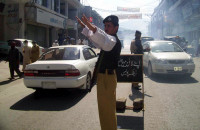
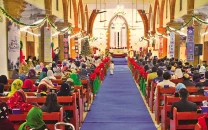

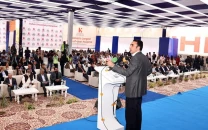
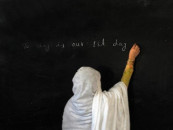


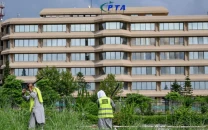










COMMENTS
Comments are moderated and generally will be posted if they are on-topic and not abusive.
For more information, please see our Comments FAQ